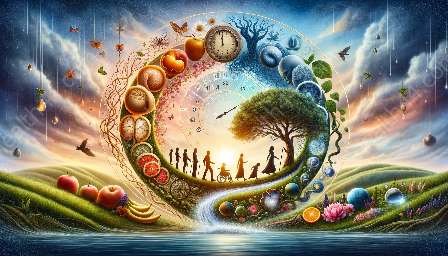As individuals age, they may encounter age-related diseases and conditions that impact their reproductive health. Understanding the intersection of aging and reproductive health is essential for maintaining overall well-being.
Age-Related Diseases and Conditions Affecting Reproductive Health
Age-related diseases can impact reproductive health in various ways. For women, menopause is a natural transition that marks the end of reproductive years. Menopause brings about a reduction in estrogen levels, leading to symptoms such as hot flashes, vaginal dryness, and mood changes. Additionally, women may experience age-related conditions such as endometriosis, uterine fibroids, and pelvic floor disorders, which can affect fertility and reproductive function.
On the other hand, men may experience age-related declines in reproductive function, including decreased sperm quality and lower testosterone levels. Conditions such as erectile dysfunction and prostate issues become more prevalent with age, affecting male reproductive health.
Reproductive Health in Relation to Aging
Reproductive health undergoes significant changes as individuals age. Fertility declines in both men and women, making conception more challenging. Advanced maternal age is associated with a higher risk of pregnancy complications and genetic abnormalities in offspring. Older fathers also face increased risks of fertility issues and genetic mutations in their sperm.
Moreover, aging can impact sexual health and intimacy. Both men and women may experience changes in libido, sexual function, and satisfaction as they age. Addressing these changes is crucial for maintaining healthy relationships and overall well-being.
Impacts of Aging on Reproductive Health
Age-related changes affect hormonal balance, fertility, and reproductive organs. For women, declining ovarian function and changes in the uterus and cervix can impact fertility and reproductive outcomes. Men experience decreases in sperm count and motility, as well as changes in erectile function and prostate health as they age.
Furthermore, age-related diseases such as diabetes, hypertension, and cardiovascular conditions can impact reproductive health. These comorbidities may contribute to infertility, pregnancy complications, and sexual dysfunction.
Maintaining Reproductive Health as You Age
Despite the changes that accompany aging, proactive measures can help maintain reproductive health. Regular medical check-ups, healthy lifestyle choices, and seeking timely medical intervention for age-related conditions can support reproductive well-being.
For women, staying informed about menopausal symptoms and seeking appropriate healthcare can alleviate discomfort and promote overall health. Men can benefit from regular screenings for prostate health and managing conditions that affect reproductive function.
Embracing a nutritious diet, engaging in regular physical activity, and managing stress can positively impact reproductive health as individuals age. Open communication with healthcare providers about reproductive concerns is vital for addressing age-related changes effectively.
Conclusion
Understanding the nexus between aging and reproductive health is crucial for holistic well-being. By recognizing age-related diseases and conditions that affect reproductive health and actively managing changes in reproductive function with aging, individuals can prioritize their overall health and quality of life.


